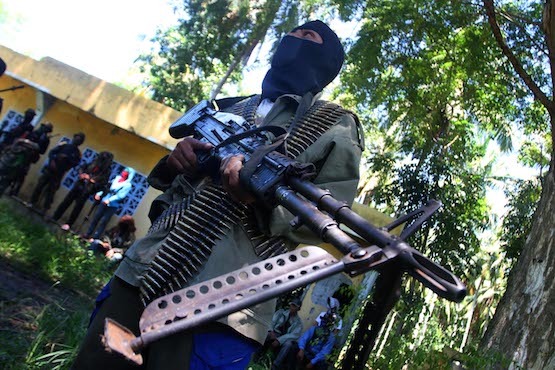Prevent infiltration of terrorists!
As Muslims flocked to mosques for Friday prayers on Jan 15, Malaysia went on heightened alert following the Jan 14 terrorist bombings in Jakarta.
Jan 21, 2016

KUALA LUMPUR: As Muslims flocked to mosques for Friday prayers on Jan 15, Malaysia went on heightened alert following the Jan 14 terrorist bombings in Jakarta.
While there was nothing in the sermon — distributed by the Department of Islamic Development Malaysia — that referred directly to the horrifying events in Jakarta, Friday sermons dwelt on the dangers of ideas and opinions, spread through social media and other means that were not in line with the Quran.
Casual observers noted that police presence was more prominent on Jan. 15 at various places around Kuala Lumpur and tourist locations around the country.
“Increased security measures are in place in public places, such as shopping malls and tourist spots,” police chief Khalid Abu Bakar assured Malaysians today.
“Extra precautionary measures will also be implemented in border areas to prevent infiltration by terrorists,” he said in a press statement hours after a deadly hail of bombs and gunfire left six dead and several others wounded in the Indonesian capital.
The police chief’s statement was striking, given the usual low-key distribution of information about the threat of terrorism in the country.
A Malaysian minister on Jan 17 singled out tourist spots and malls popular with expatriates as likely targets of militants intent on sowing fear and chaos in the country.
This followed the arrest of four suspected local Islamic State members in Iraq and Syria two weeks ago.
Federal Territories Minister Tengku Adnan Tengku Mansor cited places such as Bukit Bintang and the Kuala Lumpur City Centre, which are popular with tourist as possible targets.
Intelligence sources have identified more than 200 fighters from Indonesia and Malaysia in Katibah Nusantara — the Malay speaking arm of the Islamic State (IS).
This has put Malaysian police on the highest alert.
Katibah first came under the radar of intelligence agencies two years ago when it was called Majmu’ah al Arkhabiliy.
The unit, which started out with 100 members based in Raqqa, Syria, operated along the model set during the Afghanistan war.
“As it was during the Afghan war, militants from Malaysia, Indonesia and sometimes Singapore, banded together to form the South-East Asia faction because they spoke the same language,” said the source.
“Katibah Nusantara is likely to gain importance in IS’ strategic goals of establishing a worldwide Caliphate,” noted a study from the Nanyang Technological University’s S. Rajaratnam School of In ternational Studies.
It also indicated that Malayspeaking fighters were being organised for several reasons.
These include the fact that they are from South-East Asia, home to a sizeable number of the world’s Sunni Muslim population. About 30 militant groups in the region have already pledged allegiance to the IS.
Intelligence experts have warned that militants who return home could play a pivotal role in expanding IS’ operations and attacks, similar to that which occurred in Jakarta on Jan 14.
“It’s the returning fighters that the authorities have to watch out for.
Central to the threat is former Universiti Malaya lecturer Dr Mahmud Ahmad. It has been reported that Dr Mahmud, who is high on the wanted list for involvement with the IS, planned to unite different terror cells in Malaysia, Indonesia and the Philippines, including the dreaded Abu Sayyaf Group (ASG) and other militant groups in the region, to officially form the South-East Asian wing of IS.
Bukit Aman Special Branch Counter Terrorism Division head Senior Asst Comm Datuk Ayub Khan said Dr Mahmud, also known as Abu Handzalah, was actively training with the ASG, in addition to taking part in terror operations in the southern Philippines.
SAC Ayub said gathering reliable intelligence was integral towards preventing any attack on home soil.
“Katibah must not be underestimated. We are also monitoring to see if this splinter cell has been contacting or cooperating with any militants in Malaysia,” he said.-- The Star/Straits Times/ucanews.com







Total Comments:0